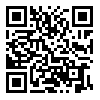BibTeX | RIS | EndNote | Medlars | ProCite | Reference Manager | RefWorks
Send citation to:
URL: http://hakim.tums.ac.ir/article-1-309-en.html
Introduction: Intrusive thoughts are a core feature of obsessive-compulsive disorder. Recent research suggests that patients and normal individuals have different strategies in dealing with intrusive thoughts. The aim of this study was to examine the relationship between obsessive-compulsive severity and intrusive thoughts control strategies.
Method: In order to assess the obsessive-compulsive symptoms and thought control strategies the Padua Inventory and Thought Control Questionnaire were used, respectively. The sample consisted of 110 students (57 boys and 63 girls) who completed the questionnaires. Data were analyzed using Pearson coefficient correlation and multiple regression methods.
Results: Results indicated that intrusive thought control strategies including re-appraisal, worry and punishment could positively predict the severity of obsessive-compulsive symptoms. In addition, the distraction strategy could predict the decrease of impaired control over mental activities- a subscale of the Padua.
Conclusion: Therefore, we suggest that in the process of psychotherapy, people with obsessional symptoms should be encouraged to put away re-appraisal, worry and punishment strategies and make use of distraction strategy more efficiently.
Hakim Research Journal 2006 8(4) 44-51.
| Rights and permissions | |
 |
This work is licensed under a Creative Commons Attribution-NonCommercial 4.0 International License. |



